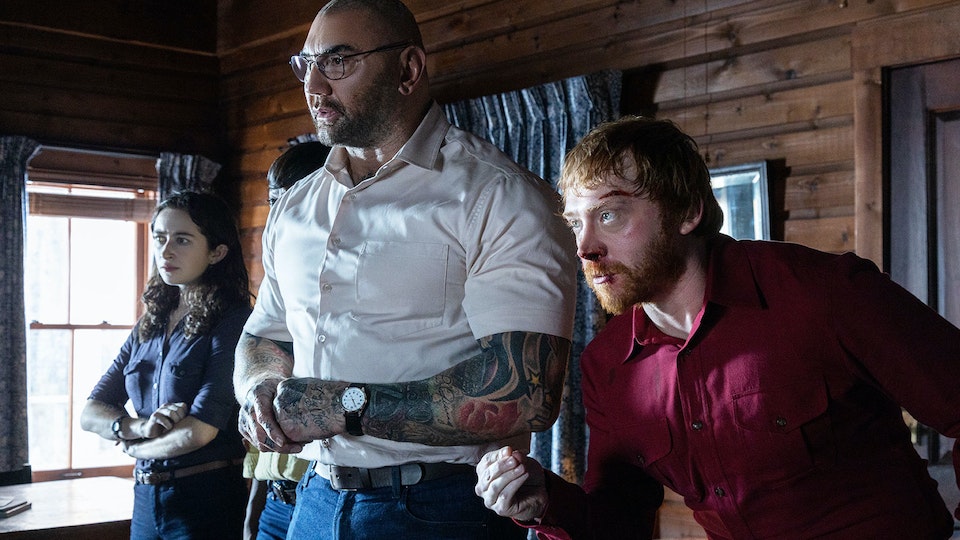(Akiit.com) (**)
Just because you can, doesn’t mean you should. For some reason veteran director M. Night Shyamalan (The Sixth Sense) has decided to put a lot of bad juju vibes out into the world. If you’re curious, read on.
It’s an unusual premise, but so what. Four strangers (Dave Bautista, Nikki Amuka-Bird, Abby Quinn, Rupert Grint) think really bad things will happen. They feel they’ve been called to stop catastrophes, natural disasters, carnage—and are convinced their mission is noble beyond reproach: “… the most important job in the history of the world.” The only way to stop the impending apocalypse is to ask a couple (Jonathan Groff, Ben Aldridge), who have a child (Kristen Cui), to make a huge life-or-death sacrifice. The messengers of gloom beg, plead and manipulate. Says one: “I don’t have a scar, but if you look inside, you will see that my heart is broken.” So what?

The confrontation occurs in a remote wooded area in Pennsylvania. The menacing quartet knocks on the door of what is called a “cabin,” but looks more like a fancy wooden structure that would rent for a fortune in Bucks County. The married twosome is gay, which is about as forward thinking as the multicultural cast of interlopers. The casting doesn’t feel necessarily exploitative, more like a reflection of life.
However, the script, by Shyamalan, Steve Desmond and Michael Sherman, does over extract from the male/male subplot with way too many flashbacks. Background sequences include apprehensive parents, a gay bashing incident and the loving adoption of their Asian daughter. None of it adds much depth to the story, and the frequent lookbacks don’t reveal anything an audience couldn’t already fathom. Also, if this film had stayed in the moment and chronologically developed the narrative bit-by-bit, minute-by-minute, it might have sustained momentum for a full 1h 40m (editor Noemi Katharina Preiswerk). It does not.
For horror fans hunting for the newest realm, forget it. Life here on earth is all you get. For sci-fi fans hoping for incredible special effects, a gigantic water plume is the only visual device of interest, and that’s an old trick. There is tension. There is bloodshed. Not like that in a gory slasher film. More in a generic thriller way dotted with repulsion as characters fight for their lives or bite the dust like champs.
It’s noticeable that the camera lens likes to be intrusive, especially in the opening scenes. Closeups on the little girl as she collects grasshoppers and a stranger who approaches her are from mid forehead to chin. It’s an odd device that doesn’t draw you into the characters. It’s just invasive enough to make you notice the technique.
Interiors and exteriors (production design Naaman Marshall), cinematography (Jarin Blaschke, The Northman and Lowell A. Meyer, Servant), costumes (Caroline Duncan) and props (Robbie Duncan) don’t’ stand out. If anything, Herdis Stefansdóttir’s heavy bass musical score drones in a way that sounds like a whale dying and it is effective.
As the two dads, Aldridge and Groff have the toughest roles, trying to pull the audience into their plight, standing strong and wavering at moments like any human would who is in shock. Aldridge has the meatier role and manages to add texture to the dad character whose history of trauma carries the most emotional weight. The four strangers are played by actors who largely don’t distinguish themselves. Except Bautista, who gets the most screen time and seems a bit deeper than the rest. But he was far more impressive in Glass Onion: A Knives Out Mystery.
Why would any responsible parent put their impressionable kid in a sadistic movie were people are mutilated in front of a little girl? Even if the actress was sheltered from the gruesome stuff, just partially knowing what the film is about has got to be weird for her psyche. She’s a tiny, undeveloped person, how is she supposed to process the plot? Someday when Kristen Cui sees this film as an adult, she might want to ask her parents: “What the —- were you thinking?”
The common denominator for most movies is a protagonist fighting an antagonist or evil until there is a winner. If audiences are expecting that clear distinction or a fitting, cataclysmic climax in this existential film about choosing between family or humanity, think again. The footage leads to a disappointing ending, though one not nearly as egregious as that in the source book, Paul Tremblay’s horror novel A Cabin at the End of the World.
Shyamalan fans will follow him off a cliff, into a tsunami or a cabin in the woods. Why? He takes them there because he can. Not because he should.
In theaters February 3rd.
Trailer:
Columnist; Dwight Brown
Visit NNPA News Wire Film Critic Dwight Brown at DwightBrownInk.com.









Leave a Reply